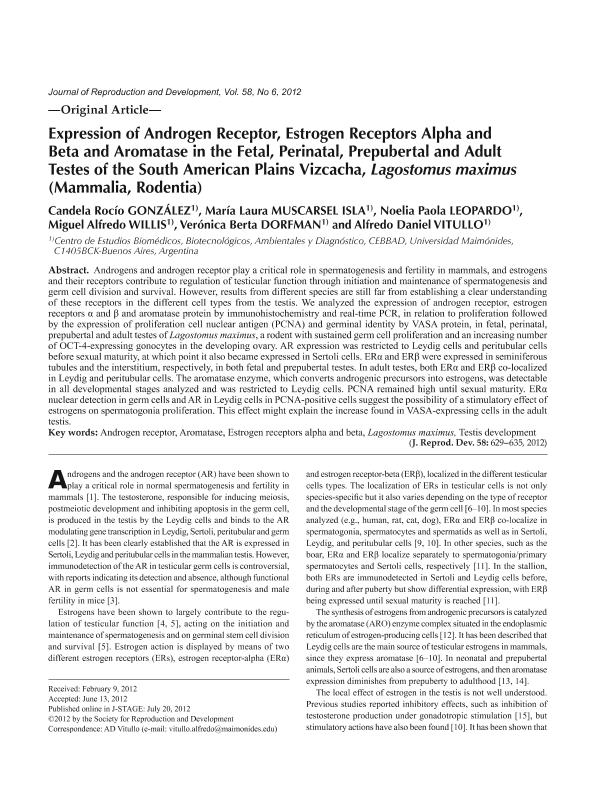Mostrar el registro sencillo del ítem
dc.contributor.author
Gonzalez, Candela Rocio

dc.contributor.author
Muscarsel Isla, María Laura

dc.contributor.author
Leopardo, Noelia Paola

dc.contributor.author
Willis, Miguel Alfredo

dc.contributor.author
Dorfman, Verónica Berta

dc.contributor.author
Vitullo, Alfredo Daniel

dc.date.available
2023-04-24T17:32:27Z
dc.date.issued
2012-07
dc.identifier.citation
Gonzalez, Candela Rocio; Muscarsel Isla, María Laura; Leopardo, Noelia Paola; Willis, Miguel Alfredo; Dorfman, Verónica Berta; et al.; Expression of androgen receptor, estrogen receptors alpha and beta and aromatase in the fetal, perinatal, prepubertal and adult testes of the South American plains Vizcacha, Lagostomus maximus (Mammalia, Rodentia); Japanese Soc Animal Reproduction, C/o I P E C, Inc; Journal Of Reproduction And Development; 58; 6; 7-2012; 629-635
dc.identifier.issn
0916-8818
dc.identifier.uri
http://hdl.handle.net/11336/195178
dc.description.abstract
Androgens and androgen receptor play a critical role in spermatogenesis and fertility in mammals, and estrogens and their receptors contribute to regulation of testicular function through initiation and maintenance of spermatogenesis and germ cell division and survival. However, results from different species are still far from establishing a clear understanding of these receptors in the different cell types from the testis. We analyzed the expression of androgen receptor, estrogen receptors α and β and aromatase protein by immunohistochemistry and real-time PCR, in relation to proliferation followed by the expression of proliferation cell nuclear antigen (PCNA) and germinal identity by VASA protein, in fetal, perinatal, prepubertal and adult testes of Lagostomus maximus, a rodent with sustained germ cell proliferation and an increasing number of OCT-4-expressing gonocytes in the developing ovary. AR expression was restricted to Leydig cells and peritubular cells before sexual maturity, at which point it also became expressed in Sertoli cells. ERα and ERβ were expressed in seminiferous tubules and the interstitium, respectively, in both fetal and prepubertal testes. In adult testes, both ERα and ERβ co-localized in Leydig and peritubular cells. The aromatase enzyme, which converts androgenic precursors into estrogens, was detectable in all developmental stages analyzed and was restricted to Leydig cells. PCNA remained high until sexual maturity. ERα nuclear detection in germ cells and AR in Leydig cells in PCNA-positive cells suggest the possibility of a stimulatory effect of estrogens on spermatogonia proliferation. This effect might explain the increase found in VASA-expressing cells in the adult testis.
dc.format
application/pdf
dc.language.iso
eng
dc.publisher
Japanese Soc Animal Reproduction, C/o I P E C, Inc

dc.rights
info:eu-repo/semantics/openAccess
dc.rights.uri
https://creativecommons.org/licenses/by-nc-sa/2.5/ar/
dc.subject
ANDROGEN RECEPTOR
dc.subject
AROMATASE
dc.subject
ESTROGEN RECEPTORS ALPHA AND BETA
dc.subject
LAGOSTOMUS MAXIMUS
dc.subject
TESTIS DEVELOPMENT
dc.subject.classification
Biología Reproductiva

dc.subject.classification
Ciencias Biológicas

dc.subject.classification
CIENCIAS NATURALES Y EXACTAS

dc.title
Expression of androgen receptor, estrogen receptors alpha and beta and aromatase in the fetal, perinatal, prepubertal and adult testes of the South American plains Vizcacha, Lagostomus maximus (Mammalia, Rodentia)
dc.type
info:eu-repo/semantics/article
dc.type
info:ar-repo/semantics/artículo
dc.type
info:eu-repo/semantics/publishedVersion
dc.date.updated
2023-04-21T15:49:11Z
dc.identifier.eissn
1348-4400
dc.journal.volume
58
dc.journal.number
6
dc.journal.pagination
629-635
dc.journal.pais
Japón

dc.description.fil
Fil: Gonzalez, Candela Rocio. Consejo Nacional de Investigaciones Científicas y Técnicas; Argentina. Universidad Maimónides. Área de Investigaciones Biomédicas y Biotecnológicas. Centro de Estudios Biomédicos, Biotecnológicos, Ambientales y de Diagnóstico; Argentina
dc.description.fil
Fil: Muscarsel Isla, María Laura. Universidad Maimónides. Área de Investigaciones Biomédicas y Biotecnológicas. Centro de Estudios Biomédicos, Biotecnológicos, Ambientales y de Diagnóstico; Argentina. Consejo Nacional de Investigaciones Científicas y Técnicas; Argentina
dc.description.fil
Fil: Leopardo, Noelia Paola. Universidad Maimónides. Área de Investigaciones Biomédicas y Biotecnológicas. Centro de Estudios Biomédicos, Biotecnológicos, Ambientales y de Diagnóstico; Argentina. Consejo Nacional de Investigaciones Científicas y Técnicas; Argentina
dc.description.fil
Fil: Willis, Miguel Alfredo. Universidad Maimónides. Área de Investigaciones Biomédicas y Biotecnológicas. Centro de Estudios Biomédicos, Biotecnológicos, Ambientales y de Diagnóstico; Argentina. Consejo Nacional de Investigaciones Científicas y Técnicas; Argentina
dc.description.fil
Fil: Dorfman, Verónica Berta. Universidad Maimónides. Área de Investigaciones Biomédicas y Biotecnológicas. Centro de Estudios Biomédicos, Biotecnológicos, Ambientales y de Diagnóstico; Argentina. Consejo Nacional de Investigaciones Científicas y Técnicas; Argentina
dc.description.fil
Fil: Vitullo, Alfredo Daniel. Consejo Nacional de Investigaciones Científicas y Técnicas; Argentina. Universidad Maimónides. Área de Investigaciones Biomédicas y Biotecnológicas. Centro de Estudios Biomédicos, Biotecnológicos, Ambientales y de Diagnóstico; Argentina
dc.journal.title
Journal Of Reproduction And Development

dc.relation.alternativeid
info:eu-repo/semantics/altIdentifier/url/https://www.jstage.jst.go.jp/article/jrd/58/6/58_2012-034/_article
dc.relation.alternativeid
info:eu-repo/semantics/altIdentifier/doi/http://dx.doi.org/10.1262/jrd.2012-034
Archivos asociados
